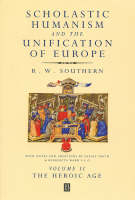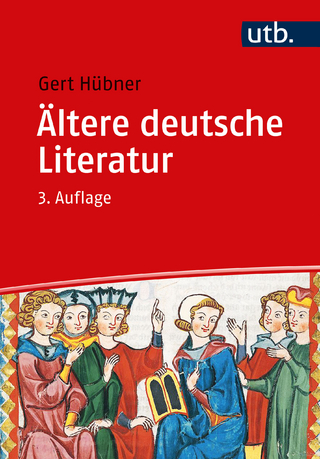
Scholastic Humanism and the Unification of Europe, Volume II
Wiley-Blackwell (Verlag)
978-0-631-22079-4 (ISBN)
This is the second of the three volumes comprising, Scholastic Humanism and the Unification of Europe. Focussing on the period from c.1090-1212, the volume explores the lives, scholarly resources, and contributions of a wide sample of people who either took part in the creation of the scholastic system of thought or gave practical effect to it in public life.
The second volume of a compelling, original work which will redefine our perceptions of medieval civilization, the renaissance and the evolution of modern Europe.
Written by a man who was widely regarded as the greatest medieval historian.
R. W. SOUTHERN is a Fellow of the British Academy and an Honorary Fellow of Balliol, Exeter, and St John’s College, Oxford, and of Sidney Sussex College, Cambridge. He was President of St John’s College, Oxford, from 1969 to 1981. He was Chichele Professor of Modern History at the University of Oxford from 1961 to 1969, and is a past President of the Selden Society and the Royal Historical Society. His publications include: The Making of the Middle Ages (1953), Western Views of Islam in the Middle Ages (1962), Western Society and the Church in the Middle Ages (1970), Robert Grosseteste (1986), and St Anselm: a Portrait in a Landscape (1990).
Preface. Abbreviations and short titles.
PART THREE – THE STRUGGLES OF SCHOLARS IN THE SCHOOLS.
Introduction.
1 Rupert of Deutz: A Voice of the Past.
I The Two Worlds in Western Europe.
II Rupert’s Life, Work, and World.
III Rupert’s Conflicts with the Schools.
IV The Final Grandeur of Events.
V Ceremonies and Symbols versus Definitions and System.
2 Master Anselm of Laon: The Master of Future Masters.
I The Grounds of His Scholastic Fame.
II The Master, the City, and the School.
III The Development of His Teaching.
IV Master Anselm’s Contribution to the Study of the Bible: The Origin of the Glossa Ordinaria.
V The Completion of the Glossa by Master Anselm’s Successors.
3 Master Anselm and the Origins of Systematic Theology.
I The Scholastic Routine: From Glosses to sententiae.
II A Student’s Collection of sententiae.
III Master Anselm’s Questions and Answers.
IV The Bridge Between the Monastic Past. and the Scholastic Future.
V Summing Up.
4 Stumbling Towards System, c. 1100–1160.
I From sentences to System.
II Early Collections of sententiae.
III The Years Between 1130 and 1160.
5 Hugh of St. Victor: A Systematic Genius Before His Time.
I His Origin and Scholarly Beginnings.
II Towards a Systematic World-View.
III Master Hugh in His Classroom.
IV Hugh’s Projected Lectures on God in Human History.
V Hugh’s Ambiguous Position in Scholastic Development.
6 Scholars at the Frontiers of Knowledge: William of Conches and Thierry of Chartres.
I William of Conches.
II Thierry of Chartres.
III Conclusion.
7 Abelard at the Frontier of Logic and Theology.
I Introduction.
II Abelard’s New Beginning.
III Logic and the Holy Trinity.
IV An Unexpected Source of Opposition (Walter of Mortagne).
V The Enlargement of Theology.
8 The Decisive Battles of the 1140s.
I The Road to Conflict.
II The First. Battle: St. Bernard and Abelard.
III The Background to the First. Battle: William of St. Thierry and St. Bernard.
IV The Second Battle: St. Bernard and Gilbert De La Porrée.
V The Significance of 1148.
9 Peter Lombard: the Great Achiever.
I Introduction.
II The Continuing Problem of Organization.
III Peter Lombard Comes to Paris.
IV Peter Lombard’s Patron: Odo (Or Otto), Bishop of Lucca.
V Peter Lombard’s Career and Work in Paris, c. 1138-1160.
VI A Comparison Between His Work and That of Bishop Odo of Lucca.
VII Summing-Up.
PART FOUR – THE STRUGGLE OF THE SCHOLARS IN THE WORLD.
Introduction.
10 Master Vacarius: A Roman Lawyer in English Government, c. 1145 to c. 1200.
I The Legend and the Reality.
II Why, and When, Did Archbishop Theobald Bring Vacarius to England?
III The Liber pauperum.
IV Vacarius in the Archiepiscopal Province of York.
V Vacarius’ Later Writings.
11 John of Salisbury: A Scholar at Large in Government.
I The End of His School-Years.
II His Transference to the World of Government.
12 The Two Peters of Blois in the Schools and in Government.
I Introduction.
II Their Relationship and Personalities.
III The Two Peters of Blois in the Schools, c. 1140–1165.
IV The Younger Peter’s Search for Employment, 1165–1174.
V Stability then Uncertainty for the Younger Peter.
VI Peter and the Third Crusade.
VII Peter in the Service of Baldwin, Archbishop of Canterbury, 1184–1190.
VIII Peter and the Call for a Crusade.
IX Peter Writes a Last Letter to His Namesake.
X The Two Peters of Blois as Poets.
XI The Letters and the World of Peter’s Old Age.
XII Epilogue: The Letter-Collection Marches On.
Index.
| Erscheint lt. Verlag | 8.11.2000 |
|---|---|
| Mitarbeit |
Anmerkungen: Lesley Smith, Benedicta Ward |
| Verlagsort | Hoboken |
| Sprache | englisch |
| Maße | 156 x 231 mm |
| Gewicht | 340 g |
| Themenwelt | Geschichte ► Allgemeine Geschichte ► Mittelalter |
| Geisteswissenschaften ► Geschichte ► Regional- / Ländergeschichte | |
| Geisteswissenschaften ► Philosophie ► Philosophie des Mittelalters | |
| Sozialwissenschaften | |
| ISBN-10 | 0-631-22079-8 / 0631220798 |
| ISBN-13 | 978-0-631-22079-4 / 9780631220794 |
| Zustand | Neuware |
| Haben Sie eine Frage zum Produkt? |
aus dem Bereich


